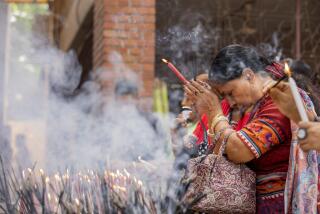More Than Religion at Stake : Violence at mosque could undermine India’s effort to reform its economy
- Share via
Hindu militants in India have once again fanned the flames of religious intolerance and riotous anarchy by attacking a favorite target: an ancient Muslim mosque on land held sacred by Hindus.
Without decisive action to restore order and to cool passions quickly, the world’s largest democracy could lose a lot more than just its image as a secular nation. The crisis could ultimately undermine the recent efforts to reform India’s anemic economy and, in so doing, could destroy its chances for prosperity.
The violence broke out Sunday when Hindus, encouraged by religious and political extremists, razed the mosque to clear the way for construction of a Hindu temple on the site--in defiance of orders by the Indian Supreme Court and appeals by Prime Minister P. V. Narasimha Rao.
At least 200 people have been killed and hundreds more injured in rioting after the destruction of the mosque. Curfews are now in effect in dozens of cities and towns.
The violence now stands to escalate as Muslim countries including Pakistan and Iran condemn the mosque attack.
Given the recent history of the 16th-Century mosque, Rao should have expected trouble. In 1990, nearly 1,000 died when violence at the mosque continued for weeks. Religious tensions seemed to subside somewhat after the assassination of Prime Minister Rajiv Gandhi in 1991.
There has been religious strife between Hindus and Muslims on the subcontinent at least since 1947, when India and Pakistan were created out of British India. Today Hindus make up 83% and Muslims about 11% of the population in India, a nation of more than 850 million people.
When Rao took office in June, 1991, he initiated a series of unprecedented reforms, junking four decades of socialist protectionism in favor of a market economy. The most important action was opening the economy to foreign investors.
The current violence, if allowed to continue unchecked, might endanger these fragile reforms. That’s just one reason that Rao must take additional steps to protect all religious minorities. That’s the only way to restore faith--both nationally and internationally--in India’s government and economy.
More to Read
Sign up for Essential California
The most important California stories and recommendations in your inbox every morning.
You may occasionally receive promotional content from the Los Angeles Times.













